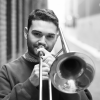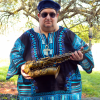Home » Jazz Musicians » Rahsaan Roland Kirk
Rahsaan Roland Kirk
Kirk was born Ronald Theodore Kirk in Columbus, Ohio, but felt compelled by a dream to transpose two letters in his first name to make Roland. In 1970, Kirk added "Rahsaan" to his name. Preferring to lead his own groups, Kirk rarely performed as a sideman, though he did record with arranger Quincy Jones, Roy Haynes and had especially notable stints with Charles Mingus. He played the lead flute and solo on Jones' Soul Bossa Nova, a song popularized in the Austin Powers films (Jones 1964; McLeod et al. 1997). His playing was generally rooted in soul jazz or hard bop, but Kirk's knowledge of jazz history allowed him to draw on many elements of the music's history, from ragtime to swing and free jazz. Kirk also regularly explored classical and pop music. Kirk played and collected a number of musical instruments, mainly various saxophones, clarinets and flutes. His main instruments were a tenor saxophone and two obscure saxophones: the manzello (similar to a soprano sax) and the stritch (a straight alto sax lacking the instrument's characteristic upturned bell). Kirk modified these instruments himself to accommodate his simultaneous playing technique. He typically appeared on stage with all three horns hanging around his neck, as well as a variety of other instruments, including flutes and whistles, and often kept a gong within reach. Kirk also played harmonica, english horn, recorders and was a competent trumpeter. He often had unique approaches, using a saxophone mouthpiece on a trumpet or playing nose flute. He additionally used many extramusical sounds in his art, such as alarm clocks, whistles, sirens, a section of common garden hose ("the black mystery pipes") and even primitive electronic sounds (before such things became commonplace). Kirk was also an influential flautist, employing several techniques that he developed himself. One technique was to sing or hum into the flute at the same time as playing. Another was to play the standard transverse flute at the same time as a nose flute. Some observers thought that Kirk's bizarre onstage appearance and simultaneous multi-instrumentalism were just gimmicks, especially when coming from a blind man, but these opinions usually vanished when Kirk actually started playing. He used the multiple horns to play true chords, essentially functioning as a one-man saxophone section. Kirk insisted that he was only trying to emulate the sounds he heard in his mind. Kirk was also a major exponent and practitioner of circular breathing.
Read moreTags
Kirk Works, Gospel Roots, New Releases

by David Brown
For this week's show, a set of works featuring Rahsaan Roland Kirk, gospel inspired tracks from James Brandon Lewis and Ray Bryant, solo piano from Mal Waldron and Matthew Shipp, and new releases from Eri Yamamoto (pictured), Anna Webber, Hiromi and more. Playlist Thelonious Monk “Esistrophy (Theme)" from Live at the It Club-Complete (Columbia) 01:50 Jaki Byard “Parisian Thoroughfare" from The Jaki Byard Experience (Prestige) 02:30 The Rahsaan Roland Kirk Quartet “From Bechet, Byas, And Fats" from Rip, ...
Continue ReadingBill Evans, Fire! Orchestra, Roland Kirk Orchestral Works + recent releases and old finds

by David Brown
Join us for another week of the Jazz Continuum. Old, new, in, out, where ever the music takes us. Each week we explore the elements of jazz form a historical perspective. This week we take a look at some large ensemble works from Rahsaan Roland Kirk, Bill Evans and Fire! Orchestra as well as some recent releases from Kalia Vandever, Marc Copland, Joe Chambers and more. Enjoy! Playlist Thelonious Monk “Esistrophy (Theme)" from Live at the It Club-Complete ...
Continue ReadingCharles Mingus: Mingus At Carnegie Hall (Deluxe Edition)

by Chris May
This 2-CD set takes the 1974 album Mingus At Carnegie Hall (Atlantic) and adds seventy minutes of previously unissued material recorded at the same concert. It is as worthwhile an addition to Charles Mingus' recorded legacy as 2020's previously unissued 2-CD set Charles Mingus @ Bremen 1964 & 1975 (Sunnyside). Why it has taken so long for either set to be released is anybody's guess. But at least we have them now. Mingus led many great bands ...
Continue ReadingTransforming A Popular Song

by Matthew Michael Sweeney
One of the most transformative experiences in my life happened while drifting around the Museum of Modern Art in New York a few years ago, standing in awe before Picasso's Seated Woman, one of the many “portraits" of his mistress Marie-Therese Walter. I was astounded at the huge discrepancy between her photograph, which was displayed along with the portrait's descriptive text, and his breath-taking interpretation of her presence in that painting. What kind of genius does it take to transform ...
Continue ReadingRahsaan Roland Kirk: An Alternative Top Ten Albums Guaranteed To Bend Your Head

by Chris May
Jazz musicians are rarely called shamanistic but the description fits Rahsaan Roland Kirk precisely. Clad in black leather trousers and heavy duty shades (he was blind from the age of two), a truckload of strange looking horns strung round his neck—two or three of which he often played simultaneously--twisting, shaking and otherwise contorting his body, stamping his feet, exhorting audience members to feel the spirit and make some noise and handing out bags of penny whistles to help them do ...
Continue ReadingThe Authenticity of Rahsaan Roland Kirk (1961 - 1972)

by Russell Perry
Roland Kirk, who began recording in 1956, had been an ideal sideman for Charles Mingus, appearing on the 1961 release Oh Yeah. In the 1960s, he established himself in the first tier of jazz players with a series of well-received records for Mercury and Limelight before settling into a decade-long relationship with Atlantic. “A stellar soloist, he could play with authenticity and forcefulness in any jazz style, from trad to free, and on a host of instruments—not just ...
Continue Reading(Not So) Standards

by Ludovico Granvassu
For decades jazz standards have provided improvisers with both a vehicle and a testing ground for their creativity. In some cases they have taken more liberties than others. This week we focus on not-so-standard renditions of jazz standards, from “Take Five" to “My Favorite Things," from “Mood Indigo" to “'Round Midnight," two hours of jazz played with boundless creativity (and a good dose of humor!). Happy listening! Playlist Farmers Market “Take Five -Take 11" from ...
Continue ReadingJazz Musician of the Day: Rahsaan Roland Kirk

Source:
Michael Ricci
All About Jazz is celebrating Rahsaan Roland Kirk's birthday today!
Kirk was born Ronald Theodore Kirk in Columbus, Ohio, but felt compelled by a dream to transpose two letters in his first name to make Roland. In 1970, Kirk added “Rahsaan" to his name. Preferring to lead his own groups, Kirk rarely performed as a sideman, though he did record with arranger Quincy Jones, Roy Haynes and had especially notable stints with Charles Mingus. He played the lead flute and ...
read more
Jazz Musician of the Day: Rahsaan Roland Kirk

Source:
Michael Ricci
All About Jazz is celebrating Rahsaan Roland Kirk's birthday today!
Kirk was born Ronald Theodore Kirk in Columbus, Ohio, but felt compelled by a dream to transpose two letters in his first name to make Roland. In 1970, Kirk added “Rahsaan" to his name. Preferring to lead his own groups, Kirk rarely performed as a sideman, though he did record with arranger Quincy Jones, Roy Haynes and had especially notable stints with Charles Mingus. He played the lead flute and ...
read more
Jazz Musician of the Day: Rahsaan Roland Kirk

Source:
Michael Ricci
All About Jazz is celebrating Rahsaan Roland Kirk's birthday today!
Kirk was born Ronald Theodore Kirk in Columbus, Ohio, but felt compelled by a dream to transpose two letters in his first name to make Roland. In 1970, Kirk added “Rahsaan" to his name. Preferring to lead his own groups, Kirk rarely performed as a sideman, though he did record with arranger Quincy Jones, Roy Haynes and had especially notable stints with Charles Mingus. He played the lead flute and ...
read more
Jazz Musician of the Day: Rahsaan Roland Kirk

Source:
Michael Ricci
All About Jazz is celebrating Rahsaan Roland Kirk's birthday today!
Kirk was born Ronald Theodore Kirk in Columbus, Ohio, but felt compelled by a dream to transpose two letters in his first name to make Roland. In 1970, Kirk added “Rahsaan" to his name. Preferring to lead his own groups, Kirk rarely performed as a sideman, though he did record with arranger Quincy Jones, Roy Haynes and had especially notable stints with Charles Mingus. He played the lead flute and ...
read more
Videos: Rahsaan Roland Kirk

Source:
JazzWax by Marc Myers
Rahsaan Roland Kirk was one of the purest and most fascinating jazz artists and composers of the post-war period. Blind from birth, he was a soulful and experimental and romantic multi-instrumentalist who defied his own physical limitations to become the very essence of jazz in all its free but gifted glory. Here are five clips of Kirk in action... Here's Kirk playing Stevie Wonder's My Cherie Amour in Paris in 1972... Here's Making Love After Hours in 1967, with pianist ...
read more
Jazz Musician of the Day: Rahsaan Roland Kirk

Source:
Michael Ricci
All About Jazz is celebrating Rahsaan Roland Kirk's birthday today!
Kirk was born Ronald Theodore Kirk in Columbus, Ohio, but felt compelled by a dream to transpose two letters in his first name to make Roland. In 1970, Kirk added “Rahsaan" to his name. Preferring to lead his own groups, Kirk rarely performed as a sideman, though he did record with arranger Quincy Jones, Roy Haynes and had especially notable stints with Charles Mingus. He played the lead flute and ...
read more
Jazz Musician of the Day: Rahsaan Roland Kirk

Source:
Michael Ricci
All About Jazz is celebrating Rahsaan Roland Kirk's birthday today!
Kirk was born Ronald Theodore Kirk in Columbus, Ohio, but felt compelled by a dream to transpose two letters in his first name to make Roland. In 1970, Kirk added “Rahsaan" to his name. Preferring to lead his own groups, Kirk rarely performed as a sideman, though he did record with arranger Quincy Jones, Roy Haynes and had especially notable stints with Charles Mingus. He played the lead flute and ...
read more
Jazz Musician of the Day: Rahsaan Roland Kirk

Source:
Michael Ricci
All About Jazz is celebrating Rahsaan Roland Kirk's birthday today!
Kirk was born Ronald Theodore Kirk in Columbus, Ohio, but felt compelled by a dream to transpose two letters in his first name to make Roland. In 1970, Kirk added “Rahsaan" to his name. Preferring to lead his own groups, Kirk rarely performed as a sideman, though he did record with arranger Quincy Jones, Roy Haynes and had especially notable stints with Charles Mingus. He played the lead flute and ...
read more
Roland Kirk - Cuckoo Serenade

Source:
JazzWax by Marc Myers
On Sept. 16 and 17, 1964. Roland Kirk recorded tracks for an important album for Mercury called I Talk With the Spirits. It's important because of its instrumental eclecticism, its spiritual qualities and its original compositions by Kirk and playing by the group. The music holds up gloriously. It's independent-minded, it's melodic and it's soulful. On these particular days, two songs were recorded—the album's title track and Serenade to a Cuckoo. The personnel on both songs featured Roland Kirk (c-fl,African ...
read more
Jazz Musician of the Day: Rahsaan Roland Kirk

Source:
Michael Ricci
All About Jazz is celebrating Rahsaan Roland Kirk's birthday today!
Kirk was born Ronald Theodore Kirk in Columbus, Ohio, but felt compelled by a dream to transpose two letters in his first name to make Roland. In 1970, Kirk added “Rahsaan" to his name. Preferring to lead his own groups, Kirk rarely performed as a sideman, though he did record with arranger Quincy Jones, Roy Haynes and had especially notable stints with Charles Mingus. He played the lead flute and ...
read more
Rent Romus
saxophone, altoDave Mullen
saxophone, tenorTerry Edwards
saxophoneNick Rosario
tromboneJoey "G-Clef" Cavaseno
saxophone, altoKenny Kirkwood
vocalsAdam Simmons
woodwindsJeremy Terry
saxophonePhotos
Music
My Girl
From: Brotherman in the FatherlandBy Rahsaan Roland Kirk



































_with_Skip_Mcdonald_(Right)_23_n.jpg)















